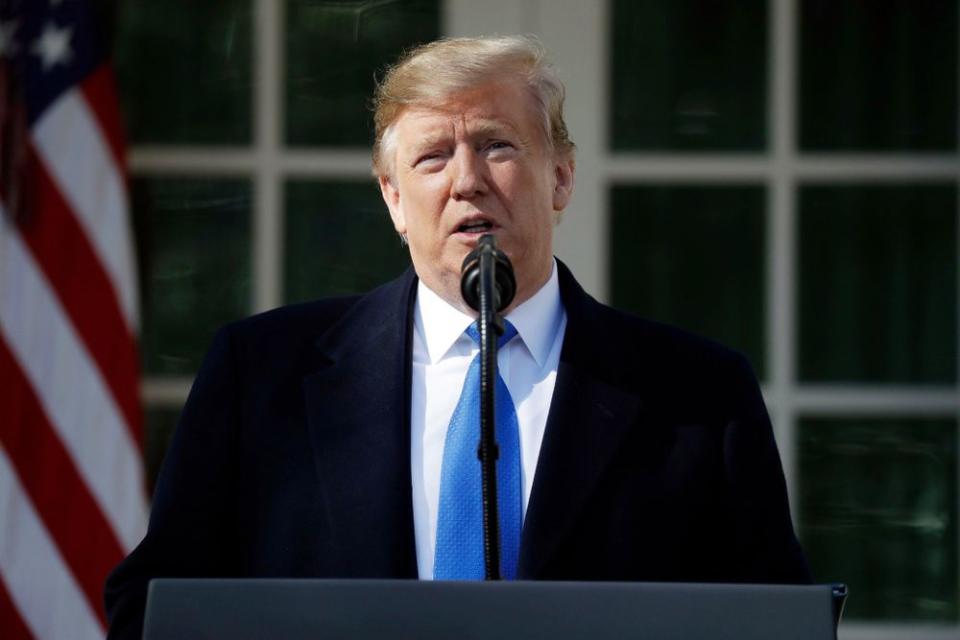Trump Declares a Sweeping 'National Emergency' at the Border to Build His Wall. Now What?

On Friday morning President Donald Trump declared there was a “national emergency” at the southern border — a sweeping move that paves the way for a legal showdown over the true scope of executive authority in absence of Congressional approval.
“It’s very simple: We want to stop drugs from going into our country, we want to stop criminals and gangs from going into our country,” the president said, returning to a familiar argument for his border wall which is not broadly supported by the data.
“They say walls don’t work,” Trump said. “Walls work 100 percent.”
He continued: “You don’t have to be very smart to know you put up a barrier, the people come in and that’s it — they can’t do anything unless they walk left or right and they find an area where there’s no barrier and they come into the United States.”
In his roughly hour-long remarks, including taking questions from reporters, the president spoke often in exaggerated terms about the situation at the border, which he repeatedly described as an “invasion.”
“We have far more people trying to get into our country today than probably we’ve ever had before and we’ve done an incredible job in stopping them but it’s a massive number of people,” Trump said. “If we had the wall it would be very easy.”
The president was sometimes contradictory, as when he noted that he did not need to declare an emergency and only did so to speed up wall construction.
The White House said it has identified up to $8.1 billion in funds the president can now access to address his “national emergency” — the majority of it from the Department of Defense, including $3.6 billion for military construction.
Trump’s long-threatened announcement was made in the Rose Garden at the White House and, on its face, is a technically legal side-step out of a grinding back and forth with lawmakers over funding for his proposed wall with Mexico.
Declaring a “national emergency” is required by law to activate a host of presidential powers that could, in the abstract, allow Trump to appropriate funds on his own in order to build a wall.
He had demanded such funding from Congress but was rebuffed by the Democratic majority in the House, swept to power in last year’s election.
In a joint statement about the emergency declaration, House Speaker Nancy Pelosi and Senate Minority Leader Chuck Schumer said the president had manufactured a crisis for his own ends: “This is plainly a power grab by a disappointed President, who has gone outside the bounds of the law to try to get what he failed to achieve in the constitutional legislative process.”
Trump’s ” unlawful declaration over a crisis that does not exist does great violence to our Constitution and makes America less safe, stealing from urgently needed defense funds for the security of our military and our nation,” they said, vowing “Congress will defend our constitutional authorities in the Congress, in the Courts, and in the public, using every remedy available.”
The president repeatedly acknowledged the likely imminence of lawsuits. At one point, in near sing-song, he described one path to victory: “We will possibly get a bad ruling and then we’ll get another bad ruling and then we’ll end up in the Supreme Court and hopefully we’ll get a fair shake and we’ll win in the Supreme Court.”

RELATED VIDEO: Reporter Who Received Trump Tax Returns Speaks Out
Even as Trump moves forward alone on the wall, he will sign a funding bill already passed by Congress to end a three-week limbo lingering over the federal government, which closed in December and January over his demand for a wall. The new funding agreement includes $1.375 billion for fencing.
The president agreed last month to temporarily reopen the nine agencies affected until Friday, giving lawmakers time to work out additional funding, including border security that he hoped would include a wall.
He said, however, that without a wall he would either shut the government down again or declare an emergency — a promise he fulfilled Friday.
While Trump has argued there is a “crisis” of violence and drugs pouring in from Mexico, Democrats dismissed a physical barrier as “immoral” and “ineffective.” (Polls show the wall is broadly unpopular with Americans as well.) Instead Democrats have proposed other border security measures including increased technological monitoring.
The president has reportedly long favored the idea of a national emergency as an escape from intractable negotiations with Congress, though he had been counseled against the idea both on legal and political grounds.
Experts say it is far from clear whether Trump’s intended use of authority for this “national emergency” will hold up in court, given how clearly it ignores Congress’ Constitutional authority over funding.
Some conservatives, too, said such a move would create a precedent that could be turned against them. Should Trump prevail, a Democratic successor could nonetheless then declare a “national emergency” over the climate or gun violence — and move just as decisively over the objections of a Republican Congress.

